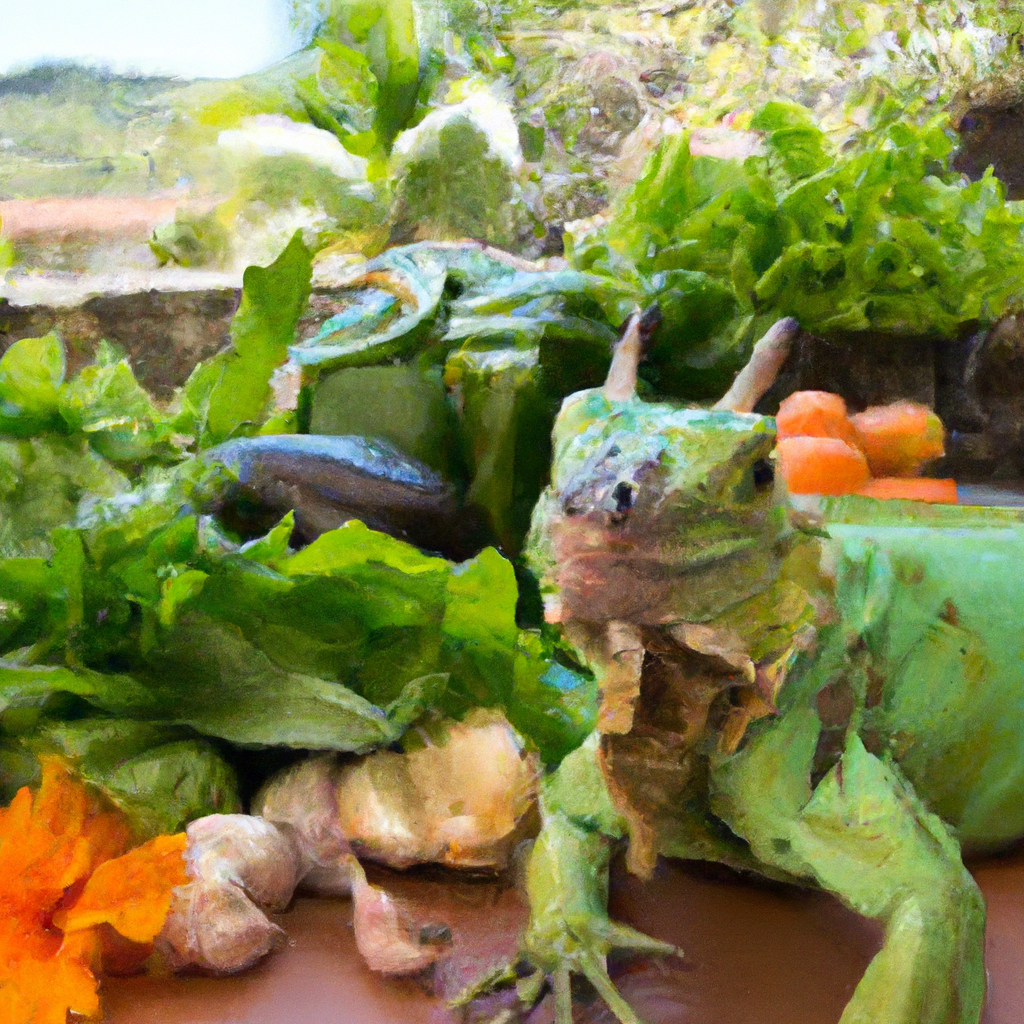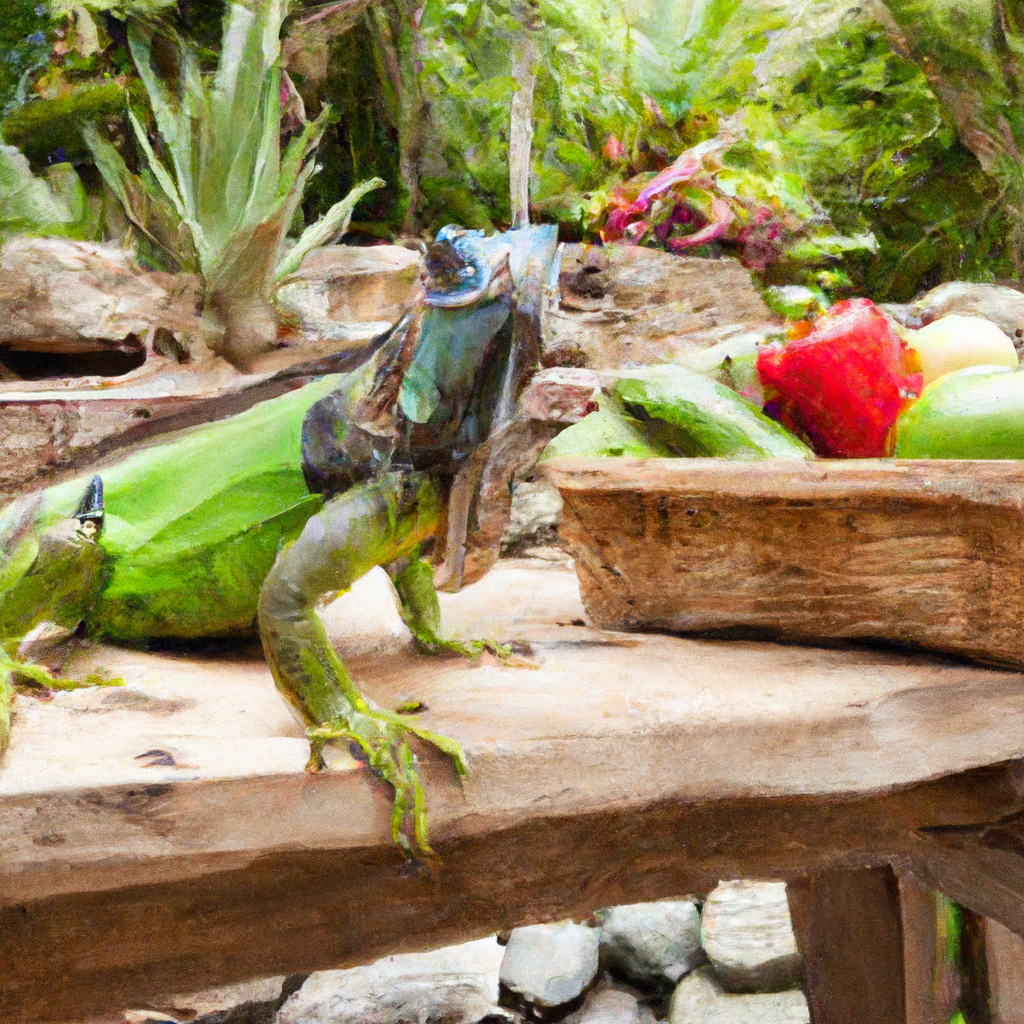In this article, we will explore the fascinating world of nutrition for iguanas. Have you ever wondered what these amazing reptiles eat to maintain their health and vitality? Look no further, as we uncover the secrets to providing a balanced and nutritious diet for your beloved iguana. From fresh vegetables and fruits to calcium-rich supplements, we will guide you on a journey to understanding the essential nutrients these fascinating creatures require for optimal growth and well-being. So, let’s dive into the realm of iguana nutrition and ensure that your scaly friend thrives in its natural habitat.

Types of Food for Iguanas
Leafy Greens
Leafy greens are an essential component of an iguana’s diet. These vegetables provide vital nutrients and fiber to keep your iguana healthy. Some great options for leafy greens include kale, collard greens, mustard greens, and dandelion greens. These greens are packed with vitamins A and C, as well as calcium, which are all crucial for the proper growth and development of your iguana.
Vegetables
In addition to leafy greens, including a variety of vegetables in your iguana’s diet is essential. Bell peppers, squash, broccoli, and carrots are all excellent choices. vegetables provide important vitamins, minerals, and fiber that contribute to overall health. Be sure to offer a mix of different colored vegetables to ensure your iguana receives a wide range of nutrients.
Fruits
While fruits should be offered sparingly, they can be a delightful and nutritious addition to your iguana’s diet. Fruits such as strawberries, blueberries, melons, and papayas can provide a tasty treat for your scaly friend. However, fruits should make up no more than 10% of your iguana’s daily food intake due to their sugar content. Too much fruit can lead to weight gain and other health issues.
Seeds and Nuts
seeds and nuts can also be included in your iguana’s diet, but they should be given in moderation. Options like pumpkin seeds and walnuts offer healthy fats and protein. However, it’s important to remember that these should only make up a small portion of your iguana’s diet, as excess fat intake can lead to obesity and other health problems.
Commercial Iguana Diet
Commercial iguana diets are formulated with the specific nutritional needs of iguanas in mind. These pellet or powder-based diets can be convenient and provide a balanced mix of nutrients. However, they should not be the sole source of nutrition for your iguana. It’s vital to supplement with fresh greens, vegetables, and fruits to ensure a varied and well-rounded diet.
Importance of a Balanced Diet
Protein
Protein plays a crucial role in the growth, development, and overall health of your iguana. While many people think of iguanas as herbivores, they do require some protein in their diet. In the wild, iguanas may consume insects and small prey, but in captivity, high-quality plant-based protein sources such as legumes and tofu can be offered to meet their needs.
Vitamins and Minerals
A well-balanced diet should provide a variety of vitamins and minerals to support your iguana’s well-being. Vitamins A, C, and E are essential for immunity, growth, and healthy skin. Minerals like calcium and phosphorus promote strong bones and normal muscle function. Including a diverse selection of leafy greens, vegetables, and fruits in your iguana’s diet will help ensure they receive these vital nutrients.
Calcium and Vitamin D3
Calcium and vitamin D3 are particularly important for iguanas to prevent metabolic bone disease. Calcium is necessary for bone health, while vitamin D3 aids in calcium absorption. Dusting your iguana’s food with a reptile calcium supplement or providing them with access to natural sunlight or UVB lighting will help prevent deficiencies and promote healthy bone growth.
Feeding Schedule for Iguanas
Age and Size Considerations
The feeding schedule for iguanas will vary based on their age and size. Hatchlings and younger iguanas should be fed more frequently to support their rapid growth. As they reach adulthood, their growth slows down, and feedings can be reduced accordingly. Additionally, larger iguanas will require more food than smaller ones to meet their nutritional needs.
Frequency of Feedings
For young iguanas, it’s recommended to feed them daily to give them the necessary nutrients for growth. As they grow older, you can gradually reduce the frequency to every other day or even a few times a week. Observe your iguana’s behavior and body condition to determine if you need to adjust the feeding schedule accordingly.
Water and Hydration Needs
Providing Clean Water
Just like any other living creature, iguanas require access to clean, fresh water. Ensure that you have a shallow water dish that is large enough for your iguana to soak in. Change the water daily to prevent the growth of bacteria and other contaminants. It’s important to note that iguanas may prefer to drink water through misting or licking droplets off leaves, so providing both options can ensure they stay hydrated.
Hydration Methods
In addition to offering clean water, you can also promote hydration by providing a humid environment. Spraying the enclosure with water or using a reptile humidifier can increase the moisture levels, mimicking their natural habitat. This helps prevent dehydration and promotes proper shedding, as iguanas often absorb water through their skin.

Supplements for Iguanas
Calcium and Vitamin D3 Supplements
To ensure that your iguana is getting enough calcium and vitamin D3, it’s recommended to use reptile-specific calcium and vitamin D3 supplements. These supplements can be sprinkled on their food a few times a week, following the dosage instructions provided. It’s important not to overdo calcium supplementation, as excessive amounts can lead to health issues.
Probiotics
Probiotics can be beneficial for your iguana’s digestive health. They help maintain a healthy gut flora, which aids in digestion and nutrient absorption. probiotic supplements formulated specifically for reptiles can be added to their diet at regular intervals. Consult with a reptile veterinarian for guidance on the appropriate probiotic and dosage for your iguana.
Feeding Techniques
Hand-Feeding
Hand-feeding can be an effective way to build trust and bond with your iguana. It involves offering small pieces of food directly from your hand. This technique can be particularly useful for introducing new or unfamiliar foods to encourage acceptance. However, be cautious of their sharp teeth and ensure your iguana is gentle while taking the food from your hand.
Feeding Dishes
Feeding dishes are a practical option for providing food to your iguana. Choose dishes that are wide and shallow, allowing easy access for your iguana to reach the food. Consider using multiple dishes to separate different types of food and prevent cross-contamination. Clean the dishes regularly to maintain hygiene and prevent the growth of harmful bacteria.
Food Presentation
Iguanas, like many animals, are attracted to visually appealing food. Experiment with different food presentations, such as arranging the food in a way that mimics their natural habitat or hiding food between leafy greens. This can stimulate their interest in eating and encourage them to try new foods. However, be mindful not to use any materials that are toxic to reptiles.

Monitoring and Adjusting the Diet
Observing Weight and Body Condition
Regularly monitoring your iguana’s weight and body condition is crucial to ensure they are receiving the correct amount of food. Weigh your iguana periodically using a suitable reptile scale or consult a veterinarian for assistance. Additionally, observe their body shape and muscle tone. If your iguana starts to lose or gain weight unexpectedly, it may be necessary to adjust their diet.
Modifying the Diet
As your iguana grows and ages, their dietary needs may change. It’s important to modify their diet accordingly to meet their evolving nutritional requirements. Consult with a reptile veterinarian or a reptile nutritionist for guidance on adjusting the types and quantities of foods as your iguana progresses through different life stages.
Common Nutritional Issues
Obesity
Overfeeding or offering high-fat and high-calorie foods can lead to obesity in iguanas. This can result in serious health problems such as cardiovascular disease and liver disease. To prevent obesity, provide a balanced diet and ensure portion control. Regular exercise and offering a stimulating environment can also help prevent excessive weight gain.
Malnutrition
Malnutrition occurs when an iguana’s diet lacks essential nutrients. This can lead to stunted growth, weak bones, and a weakened immune system. Providing a varied diet that includes a mix of leafy greens, vegetables, fruits, and occasional protein sources is vital to avoid malnutrition in iguanas.
Metabolic Bone Disease
Metabolic bone disease (MBD) is a common nutritional disorder in iguanas caused by calcium and/or vitamin D3 deficiencies. It can result in weak and deformed bones, fractures, and other skeletal abnormalities. To prevent MBD, ensure your iguana’s diet includes adequate calcium and vitamin D3 and provide access to proper UVB lighting or natural sunlight.

Age-Specific Nutritional Considerations
Feeding Hatchlings
Hatchlings have high nutritional requirements for growth. Offer a variety of finely chopped or pureed leafy greens, vegetables, and fruits. Calcium supplementation is particularly important at this stage to support proper bone development.
Feeding Juveniles
Juvenile iguanas still require substantial nutrition for growth. Continue offering a mix of leafy greens, vegetables, and fruits, but gradually introduce more adult food options. Keep an eye on their body condition to ensure they are receiving enough nutrients without becoming overweight.
Feeding Adults
Adult iguanas have slower growth rates and therefore require less food. Maintain a well-balanced diet with a mixture of leafy greens, vegetables, and occasional fruits. Adjust the portion sizes and feeding frequency to prevent weight gain.
Feeding Senior Iguanas
Senior iguanas may have reduced appetite and slower metabolism. Offer a diet rich in vitamins and minerals to support their health in their golden years. Special attention should be given to their calcium intake to prevent age-related bone issues.
Common Mistakes in Iguana Nutrition
Feeding Improper Foods
One common mistake is feeding iguanas foods that are not suitable for their digestion. Avoid feeding your iguana foods that are high in fat, salt, or sugar, as they can cause health problems. Additionally, certain foods such as spinach and iceberg lettuce have low nutritional value and should be fed in moderation or avoided altogether.
Overfeeding
Overfeeding can occur when the quantity of food offered exceeds an iguana’s needs. This can lead to obesity and associated health issues. Pay attention to portion sizes and adjust them according to your iguana’s age, size, and activity level. It’s better to slightly underfeed than overfeed to maintain a healthy weight.
Lack of Variety
Offering a limited variety of foods can lead to a monotonous and imbalanced diet. Iguanas require a diverse range of nutrients, so it’s important to provide them with a wide selection of leafy greens, vegetables, and fruits. Including different colors, flavors, and textures in their diet can also help stimulate their appetite and maintain their interest in eating.
In conclusion, providing a well-balanced and varied diet is crucial for the overall health and well-being of your iguana. By incorporating leafy greens, vegetables, fruits, seeds, and nuts, as well as commercial iguana diets, you can meet their nutritional needs. Remember the importance of protein, vitamins, minerals, calcium, and vitamin D3 in their diet. Develop a feeding schedule based on their age and size, and ensure they have access to clean water and proper hydration methods. Use supplements like calcium and vitamin D3 to prevent deficiencies, and explore different feeding techniques to enrich their dining experience. Regularly monitor their weight, body condition, and adjust their diet accordingly. Be aware of common nutritional issues such as obesity, malnutrition, and metabolic bone disease. Tailor the diet to their specific life stage, from hatchlings to senior iguanas. Avoid common mistakes such as feeding improper foods, overfeeding, and lack of variety. With proper nutrition, you can help ensure your iguana leads a healthy and fulfilling life.

